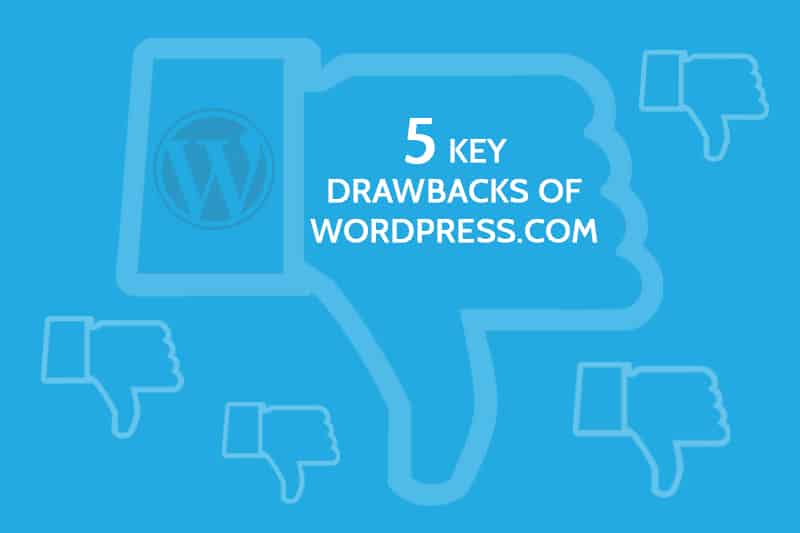
WordPress is a great way to run your website and self-publish personal thoughts, creations and more. You have two ways you can use this popular system: a) the free WordPress.com hosting service, and b) paid hosting servers. Although WordPress.com is free, it does come with several downsides.
Here are five of the major drawbacks of WordPress.com.
1. Basically Less Control
The big one should be knocked out of the way first. WordPress.com prevents you from editing many of the sections of your page. You have zero access to editing PHP files, or most other types for that matter. This greatly limits customization.
Want to include Javascript? Nope. Sorry, it is prohibited. You want to add that really cool widget you found to your website? Chances are you cannot. WordPress.com limits you to their default choice of widgets and tools to use on your website’s layout.
This makes it much more difficult to build onto your unique corner of the Internet.
2. Not the Same Set of Tools
It might be a surprise to some, but the version of WordPress you see on WordPress.com and the version of WordPress you get from WordPress.org are not the same. This is especially true from the admin panel view.
While the WordPress.com version shares a lot of the same features as a hosted WordPress account, the two platforms are on distinctively different developmental tracks.
Many people have mentioned on forum threads that WordPress.com is behind the times when it comes to new features. If you want the latest and greatest version of WordPress, you need to install it on your own hosting account.
This WordPress.com drawback will leave a lot of people wondering, “Why can’t I?” on WordPress.com while you can do tons of things on a hosted version of WordPress.
3. No Support for Plugins
The freedom of WordPress comes from the power of tweaking it. Adding your own third-party plugins or themes is how you can really customize WordPress and make it your own. WordPress.com does not allow this.
There is no way to extend the functionality of WordPress via WordPress.com beyond what the site provides. You are stuck using the enabled features from a basic WordPress installation.
The ability to check out some of the amazing features that installing plugins provides is a great reason to switch to hosting WordPress yourself.
4. No Support for Themes
In the arena of theme customization, you are locked down to only being able to use the themes available to you at WordPress.com. Some of themes are free to use while others might come at a price.
Unfortunately, you cannot modify themes on WordPress.com. If you want to use one of the really powerful WordPress themes that bring in new ecommerce or content management system functions, you are out of luck.
This includes any third-party premium themes you may want to buy to accentuate the website.
5. WordPress Commercialization
When you are building your own digital empire, limitations is not a word you want to hear. One of the biggest limitations for online entrepreneurs is the fact that you cannot monetize most of the content on WordPress.com.
Well, I take that back, you can, however you must join WordPress.com’s own advertising program. Besides that, you are not allowed to use your free blog for any commercial activity.
That is a level of control over your content WordPress.com will have over your entire website. On a hosted WordPress installation, you are free to use ad content from any resource out there.
Hosted WordPress is Often the Best Route
Signing up on WordPress.com is the easier route, however hosting your own WordPress account is the better way to go if you want a greater degree of online success. WordPress.com gives you have very limited sandbox to play in when you compare it to your own hosted WordPress installation.
While WordPress.com does have a few advantages, spending a little money to host it yourself will lead you to a much more customizable digital domain.
I would say WordPress.com would be a great way for somebody to get their feet wet with WordPress and blogging. As soon as you need to do more with your website, you will want to move towards hosting WordPress on your own web hosting plan.
This way you gain full and total control over the script. With the power of third-party add-ons and themes, you can build any type of website you can imagine.
